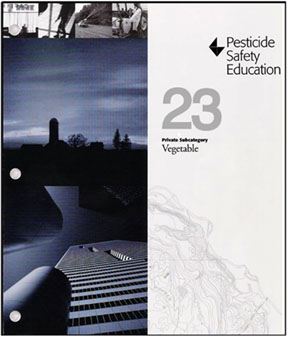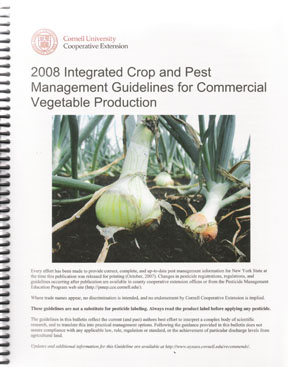Cooperative Extension Off-Campus Staff Pesticide Guidelines
Guidelines For Cornell Cooperative Extension Off-Campus Staff Who Conduct Demonstrations Or Research With PesticidesMany agricultural chemicals are classified as hazardous materials and require the highest degree of care and safety when being applied, transported, or stored. This includes state and federally registered pesticides as well as those chemicals used under experimental investigations.
The policy for Cornell Cooperative Extension (CCE) off-campus staff using pesticides in demonstrations and research is outlined below.
- Only those pesticides registered in New York State may be used by CCE off-campus
staff for field demonstrations.
- Pest management recommendations originate with the research/extension faculty.
Printed or verbal recommendations of CCE off-campus staff must not differ from
those developed by the faculty and from the labels of those pesticide products
registered in the state of New York.
- If chemical company representatives contact CCE off-campus staff and request their participation in demonstrations or research with registered pesticides, the appropriate research/extension faculty in the subject matter area should be consulted before starting the project.
- Pest management recommendations originate with the research/extension faculty.
Printed or verbal recommendations of CCE off-campus staff must not differ from
those developed by the faculty and from the labels of those pesticide products
registered in the state of New York.
- The use/investigation of unregistered pesticides must be under the direct
supervision of the appropriate faculty member of the College of Agriculture and
Life Sciences having knowledge of the nature of such chemicals. No portion of
the treated commodity should enter trade channels, unless it has been clearly
established that no residue results from the treatment(s) or that a tolerance or
an exemption from the requirement of a tolerance exists for the chemical(s) in
or on the food, feed or animal(s).
- Pesticide chemicals with an experimental use permit (EUP) will not be used in
demonstrations by CCE off-campus staff. Research with EUP chemicals can be
undertaken, but must be conducted on a cooperative basis with the company
representative and appropriate faculty member(s). The research must be conducted
in accordance with restrictions and limitations stated on the EUP label and
permit.
- Pesticides which have a temporary tolerance established by EPA in or on food,
feed, or animals may be used for research within the limits of that temporary
tolerance. Most temporary tolerances have been issued in conjunction with an EUP
and the procedures outlined above must be followed. Pesticides with a temporary
tolerance can be used on food/feed crops and animals for consumption provided
the EUP directions permit such use.
- Precautions to protect personnel, property, the public, the environment, and
other interests must be employed where EUP investigations are undertaken. All
precautions, restrictions, and limitations issued under an EUP and/or on the
container of a registered pesticide product must be followed.
- All CCE employees assisting in field demonstrations and/or research must be certified in those pesticide applicator categories related to their work environment. This also includes being certified in the Demonstration and Research Category (Category 10).
Suggested Demonstration and Research Procedures
Prior to conducting demonstrations or research with pesticides on land, crops, and/or animals not owned or controlled by the College of Agriculture and Life Sciences, the following steps should be taken:- Consult with the appropriate faculty member(s) of the College of Agriculture and
Life Sciences before making any commitments. Make certain that plans conform
with the policy outlined in the previous section.
- Obtain the necessary instructions, chemistry and toxicological data,
environmental data, Material Safety Data Sheets (MSDS), etc. so there is
assurance that the health of the applicators or that of others will not be in
jeopardy.
- Obtain information from the sponsor/principal investigator or the producer of
the pesticide relative to acceptable methods of crop/animal destruction if
tolerances have not been established and the commodity is not allowed for human
consumption. Obtain a written statement outlining the individual(s)
responsibility for disposing of the commodity and providing any compensation.
All unused pesticides and their containers associated with the demonstration
and/or research should be returned to the manufacturer/sponsor.
- Provide all land owners, where EUP investigations/demonstrations are undertaken,
with the appropriate information as outlined in number 2 above.
- Secure a written statement to keep on file outlining the contributions and responsibilities of each party.
2/93
Cornell University is committed to making our websites accessible to everyone, including individuals with disabilities. To report a problem or to request an accommodation to access online materials, information, resources and/or services, please contact web-accessibility@cornell.edu. In your message, include the website address or URL and the specific problems you have encountered. You will receive a reply as soon as possible.





